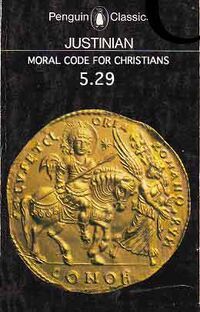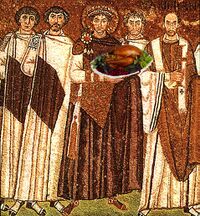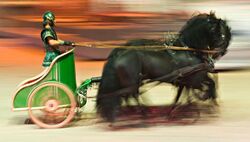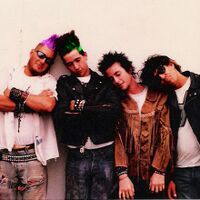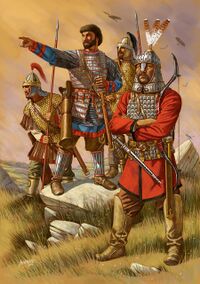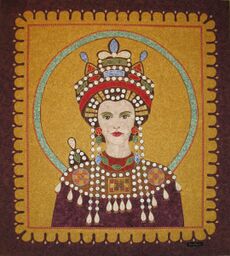Justinian I
Justinian I (Latin: Flavius Justinianus Bossibootus; 482 – 14 November 565) was the Byzantine Emperor from 527 to 565, as well as a polyvexatious polymath, armchair Caesar, and bully for his bespoke version of Christianity. He sought to reunite the world under his personal rule, to reclaim the lost Roman Empire in the West, and to introduce his own 'Justinian Code' to replace the buggy, broken Theodosian Code' and reclaim the monopoly on truth.
In his spare time, Justinian closed down Plato and Aristotle's old school in Athens and deposed a pope in Rome for arguing with him. Justinian feared no man, but was scared of violent thunderstorms. Also of his wife, Empress Theodora, a one-time stripper, enthusiast of lewd games — and eventual Greek Orthodox saint. When she died, Justinian showed how much he missed her by getting everything wrong.
Early years[edit]
Justinian was born Peter Sabbatical near Belgrade, around 482. He was called Sabbatical because he would often disappear without reason for six months or longer.
It was a rough time to be born. This area of the Roman Empire had been tramped through by a colourful array of barbarian warlords, including Alaric the Goth, Attila the Hun, and Annatto the Savoury. Whilst Peter was growing up, Emperor Zeno bribed the last batch of unwanted house guests — the Ostrogoths — to piss off to Italy and leave the Balkans alone. Peter was old enough to watch the Ostrogoth leader Theodoric the Great saunter past his window on a great black stallion and disparage the military weakness of the Romans with a single raised middle finger.
Peter's rural life was transformed when Uncle Justin landed a job in Constantinople, the capital of the Byzantine Empire. Justin worked well in the post, but couldn't read and wouldn't rely on eunuchs to read things to him, so he called for Peter to come read his pay slip to him, with the title of Excubitor.[1]
In 518, geriatric Emperor Anastasius I died. He tried to bequeath the gig to a family member, but Constantinople's power elite rejected that, and Justin got the post instead. Peter promptly did two things: He strategically adopted the name Justinian, and he met his wife Theodora. Justinian was dazzled by Theodora. Perhaps he caught her nude act down at the Hippodrome Nightclub, where she propelled marble balls into wine cups with her awesome pelvic love muscles.[2] For Justinian, a dull, bookish scholar of theology and the works of bearded bores in the nearby monasteries, meeting Theodora was a real glass-popper.
The couple married in the Hippodrome church. Theodora brought along her family and her children from casual affairs during her acting career. Luckily, she didn't invite any bears, though her father had run the Byzantine Animal Entertainment department at the Hippodrome. Emperor Justin wasn't sure this was a good match, but gave his blessing. However, he died soon after, supposedly killed by an escaped bear wearing a green ribbon (more about this below).
Promotion and flash house-cleaning[edit]
In 527, when Justin died, Justinian became emperor. His first act was to close down Plato's Academy in Athens for 'paganism, student abuse, and all-around meaningless philosophising.' It took two years to implement, but finally, Greece's finest eggheads were turfed out of their college buildings and told to get proper jobs. Justinian crowed about this act throughout the Byzantine Empire.
| “ | For too long, the Roman state has had to pay for these loafers. They can go out and get a proper job, or become bishops. This is a Christian Empire and we have no need of idle paper-pushing. Vote Purple! | ” |
—Justinian | ||
Around this time, a lot of pagan classics ended up in the flames. Old classics like Caligula's Guide to Sex Slaves and Horses was lost, along with Aristotle's Ancient Greek Jokes for Ancient Greeks. Emperor Claudius's autobiography ended up as tinder and Suetonius's 12 Best Whores in Rome (a lurid companion piece to his 12 Caesars) got the axe from Empress Theodora. Procopius writes that Suetonius's vivid descriptions came uncannily close to Theodora's own career progression from circus prostitution to palace imperialism.
My money's on Red[edit]
Whilst the rest of Western Europe fell into feudalism, banditry, and an avoidance of soap, Constantinople surpassed Rome as the region's sporting capital. Its Byzantines never warmed up to gladiatorial games, seemingly ugly and pagan, but were partial to chariot racing — about the only excitement in town apart from compulsory church services.
The ancient sport had first appeared in the 776 BC Olympics (the first Olympics, and the last one free of doping). Constantinople originally had four teams, but mergers and murder had amalgamated them into only two active teams in the time of Justinian: The True Blues and the Eco-Friendly Greens. Those loyal to the emperor adopted the Blue faction, whilst their rivals favoured the Greens. Justinian said he was a true-blue, but Theodora's family had been 'Green and proud.' However, now that she was Mrs Justinian, Theodora adopted her husband's team — to the annoyance of her old allies.
Over in Rome, chariot racing was held at the Circus Maximus, some distance from the imperial residence. However, in Constantinople, the Hippodrome was next door to the emperor's palace. A special passageway led from the palace to the imperial box seats overlooking the arena, as though Redskins Stadium were in the White House Rose Garden.
Violence always broke out on race days. In 532, a seemingly trivial decision switched sponsorship of that year's race card from Nike to Adidas. The move also withdrew the free soup and brickbats that punters used to throw at their adversaries. Both Blues and Greens blamed the Imperial government and broke out into a week-long riot — known as the 'Nike' riots, to demand the return of the original sponsor. Emperor Justinian went through four pair of purple underpants, as it had been his decision to change over to Adidas. Theodora told him to pull himself together and offered him a pair of her boxer shorts. Meanwhile, the rioters had torched most of downtown Constantinople, including Constantine's old Hagia Sophia church. This led to a lot of scavenging, but also split up the mob. Finally, Justinian let it be known he would meet the crowd in the Hippodrome for a peace parley.
| “ | ...and so the Blues and Greens filed into the Hippodrome, clutching their looted goodies to hear what the emperor was going to say. Emperor Justinian and Empress Theodora appeared in their imperial box. Justinian waved at the crowd and started pointing at people he appeared to recognise. This was the cue for soldiers to enter the arena and lock the doors behind them. Justinian cleared his throat and made the sign emperors in the past had used to declare a gladiator was unworthy of living that day. His thumb pointed down. Let the massacre begin...Within a few hours, the banners of the Blues and Greens were splattered in deep red. The riot was over. | ” |
—A historian who is not Procopius | ||
First Job: Ban the Vandals[edit]
Once the blood had been cleaned off the streets of the capital, Justinian cheered up everyone of a military bent by going to war — not against the usual hairy-backed barbarians across the Danube or going toe-to-toe with the Persians. Justinian instead targeted the Vandal Kingdom in North Africa. No one liked them; they had smashed their way across the River Rhine in 407 and kept on going through Gaul and then Spain before sailing across the straits of Gibraltar to Carthage. Then, under one-eyed King Gaiseric, they had equally got up the noses of both the Western and Eastern Roman Empires. Since then, though, the Vandals had preferred to stay at home or spray-paint their ships in psychedelic colours.
By 530, the Vandals were more an eyesore than a mighty threat. They sent an expedition to Sardinia (in Vandal territory) to take part in the Inter-Barbarian Hooligan World Cup against the Ostrogoths. Whilst they were there, Justinian ordered his general Belisarius to sneak into Carthage and capture the Vandal capital. The Byzantines, who were already gaining a reputation for institutional duplicity, drank and smashed things just like Vandals, fooling the guards to open the gates. Once inside, Belisarius and his men dropped their spray cans and captured the city. The Vandal army were unaware of this and — returning home from Sardinia in a boisterous, drunken mood after beating the Ostrogoths — were surprised by the stone-cold sober Byzantines. The Vandals were crushed and their leaders sent back to Justinian. He ridiculed them and had them dragged around the Hippodrome in a victory celebration.
Second Job: Wash the Goths[edit]
Justinian used the confiscated loot of the Vandal empire to rebuild Constantinople and a new Hagia Sophia (though, since most of it had come from the Roman Empire, the Byzantines felt entitled to it). Justinian gave Belisarius a mighty triumph, a pay raise, and a map of where he was going for his holidays: Italy.
The emperor argued that Italy was just another wayward old Roman province, crying out to be reunited with the motherland. The ruling barbarians there, the Ostrogoths, had been acting like the big "Goth I-Ams' under their ruler, Theodoric the Great. They were also Christians, but not Catholic Christians, which fit them way below the Persian 'fire worshippers' or other pagans. Like the Vandals, the Ostrogoths hadn't produced another great leader and had fallen into bloody feuds and fashion shows that had made them unpopular in Italy.
Once again, Belisarius had it easy. The disunited Goths abandoned Rome to Belisarius. Out of the ancient city came the senators and their various cronies and lobbyists. Leading them was Pope Silverius, who gave the Byzantine general the keys and padlocks of the old capital. Belisarius thanked the 'grey-haired old fool' and then had him arrested, as Justinian said the Pope was too 'Goth-friendly.' Justinian proved it by revealing Silverius had tattoos on his arms that read 'Theodoric for Ever' and 'I Love Arian Goths' — and also happened to be a son of an earlier Pope who had sown his wild oats before taking the holy wafer. This seemed sufficient grounds to have the old fraud kicked off St. Peter's Chair and replaced by Pope Vigilius.
Belisarius chased the Goths all the way back to Ravenna. Their King Witiges offered to make Belisarius an 'emperor' and restore the Western Roman Empire. Belisarius went along with the plan and invited a battalion of choir boys to officiate at the coronation. Once inside, those trickster Byzantines removed their disguises and arrested Witiges. Now, Constantinople once again held Ravenna (and Italy) close to its heaving bosom.
Justinian, worried that Belisarius was winning too easily — and that the offer of emperor was too realistic — recalled Belisarius back East, to deal with the treaty-breaking Persians. Witiges came along for the ride. But, surprise! Witiges had been the problem all along. The Ostrogoths elected a new king named Totila. He finally got the Ostrogoth shit together. Totila and his flotila battled the Byzantines up and down Italy for ten years. The Goths made like Vandals, knocking over Rome's aqueducts. Justinian immediately let a contract to repair them, but thanks to labour disputes, the Mafia, malaria, and days off to watch football, the job was not finished until the 16th century.
Death of the Missus[edit]
In 548, Justinian promised that he and wife Theodora would return to Ravenna to formally re-unite the Roman Empire. He commissioned a team of mosaic workers to record this visit. But — just as the bags were packed and the mosquito-repellent sun cream applied — Theodora was dead. The mosaic remains, a record of a visit to Ravenna that never happened.
Theodora's enemies said she died performing her disgusting party tricks and that a humour-free God had struck her dead at a banquet. Justinian cancelled the trip to Ravenna and locked himself away in his musty library.
The funeral of Theodora was a glittering affair, though the official church said she was a heretical Christian. Justinian shut them up by placing some of the loudest complainers in the bear cages for a night. A song was commissioned, "Don't Cry For Me, Theodora", and cheap souvenirs with her likeness went on sale at the palace gift shop.
Justinian led the mourners. Many hoped the Emperor, now pushing 70, would retire and spend more time clipping roses in the garden. However, spraying the greenfly wasn't Justinian's interest. He was far keener on something else: Theology.
Religious business and a new Christian Business Centre[edit]
Justinian sought to reconcile Christians within his empire. Two hundred years earlier, Emperor Constantine the Great had done so at the First Council of Nicaea, but it hadn't stopped the unbrotherly love of Christians persecuting and killing each other. Church councils had been called to 'thrash out differences,' but had instead seen the fragmentation of Christianity into two main groups: the 'One Nature' (Monophysite) Christians, who said Jesus was a blended mix of God and Man; and the 'Two Nature' Christians, who maintained Jesus had somehow kept them separate yet united, as he had been a perfect God and perfect Man at the same time. This dispute had seen a lot of broken crockery, anathemas issued, and quite a few murders, but no resolution. Many still supported the One Nature view of Jesus, especially in Egypt and Syria.
The emperor cut to the basics and came up with a new Christian unity formula: Justinian Knows Best. In 543, he issued a condemnation of the 'Three Chapters'. Justinian produced his own theological paper. It condemned three past Christian theologians as 'neo-Nestorians' for writing three heretical works supporting extreme 'dual naturism', nudity and heresy. However, all three had been given the all-clear by the Council of Chalcedon. So did this mean that council's decisions were not correct?
The bishops in the Greek East agreed with Justinian and the works were symbolically burnt in an oven. The authors were long dead, but the bishops narrowly decided against digging up the bones and feeding them to the dogs. But in Rome and the Latin West, this led to a repudiation of Justinian's judgement. The emperor who had been pleased with his work was deeply angry. This was amplified when Pope Vigilius echoed those opposed to the emperor's theological views. Justinian sent out an arrest warrant. Get that Sonofabitch now!
Vigilius was dragged off to Constantinople. Justinian kept the poor fellow six years in a freezing cold and damp corridor whilst working through various excuses not to see him. Eventually, in 553, a new church council was summoned to meet in Constantinople. Their instructions were 'to agree with the emperor or go into involuntary exile,' simple. Vigilius was invited to attend, but preferred to stay in a bed-and-breakfast monastery in the city. The result vindicated Justinian's theological tinkering. The resulting dogma was 'Chalcedonian Christianity — Updated Editon'. Justinian was happy. Pope Vigilius signed on. He was let out.
Third Job: There's more Goths over here[edit]
It took another decade for the last of the Ostrogoths to be either killed or bathed. In honor of the victory, Justinian sent a fleet to Visigoth Spain — implying that his War on Arians was entering its final stages.
It was odd that Justinian had given the job of crushing the Ostrogoths to Narses, a palace eunuch. It was equally odd that he assigned Visigoth Spain to Liberius, a Roman of the very old school, as in 90 years of age. The Byzantine army landed and helped the rebels against King Agila. The rebels won but had no money to pay the Byzantines to go home. The Byzantines settled for the sum of Southeastern Spain, which was annexed to the Byzantine Empire. More trickery!
Finally, Belisarius was recalled from retirement. The commission did not go well, as Belisarius was dead. So Justinian organised a parade whose co-marshals — the corpses of Belisarius and the late Empress Theodora — rode side-by-side in front of the Byzantine soldiers.
A final word[edit]
Justinian lived on to 565. He finally finished the Justinian code and forced everyone to upgrade to the Premium Edition. This cost money, so Justinian scrimped on paying his soldiers and solicited extra gifts to maintain peace.
On his tomb, the Byzantine tourist board said millions had come into Constantinople to see the 'old git' in his coffin. Justinian was buried with his boring books and everything else he had collected over the years. Many centuries later, in 1204, soldiers from the off-course Fourth Crusade sacked the ancient Byzantine capital. They said, when the tomb lid was lifted off, the mummified remains of Justinian sat bolt-upright, he uttered his final words ('I'm as a dry as a dead dog's dick'), and then his bones crumbled into dust.
References[edit]
| Preceded by: Justin I |
Byzantine Emperor 527–565 |
Succeeded by: Justin II |
